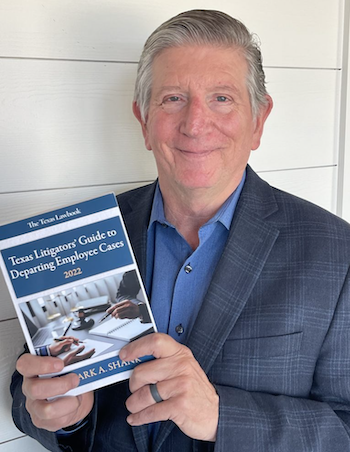Mark Shank was a sophomore in high school when he read a novel by Irving Wallace called The Seven Minutes. Published in 1969 by Simon & Schuster, the book is a legal thriller about a First Amendment trial over the banning of a book considered “the most obscene pornography ever written.”
The trial lawyer in the book won an historic jury victory for the author and convinced a teenaged Shank he should become a lawyer.
Five decades later, Shank is a senior counsel at Diamond McCarthy and is the author of the 2022 edition of The Texas Litigator’s Guide to Departing Employee Cases, which he co-authored with Dallas lawyers David Wishnew and Greg McAllister. Wishnew is a partner at Crawford Wishnew Lang and McAllister is a partner at the Rogge Dunn Group.

First published in 2016, The Texas Litigator’s Guide is updated with the most recent court decisions, statutory changes and regulatory advisories, and it is widely viewed as the go-to resource for Texas lawyers handling litigation regarding departing employees.
With 13 chapters, The Texas Litigator’s Guide addresses the legal and practical aspects of handling cases while helping to avoid pitfalls. The book is divided into two sections: Part one looks at the law and the second part addresses litigation strategy.
An avid barefoot water skier, Shank did a virtual sit-down interview with The Texas Lawbook that covered his life, legal career and the behind-the-scenes making of his book.
Please visit Texas Lawbook Publishing to order your copy of The Texas Litigator’s Guide to Departing Employee Cases.
Texas Lawbook: Where were you born and where did you grow up?
Mark Shank: I was born in Quincy, Illinois, and lived in a very small farm town called Clayton until the age of 12. Then we moved to Lake of the Ozarks, Missouri, where my family lived until I moved to Texas in 1980.
Lawbook: Tell me about your family and what they did. Were any lawyers in the family?
Shank: No lawyers in the family. My grandfathers’ generation was all farmers. My parents were serial entrepreneurs. My father ran a plumbing and heating business until we moved to Missouri. There we ran a small lakeside resort as a family.
Lawbook: What are one or two life-changing experiences you have had?
Shank: My wedding day and the days my three children were born
Lawbook: After law school at the University of Missouri, what led you to get an LLM. degree at SMU?
Shank: While in law school I met my wife, a native Texan. When we decided to move, I acted on my interest in labor and employment law by enrolling at SMU. It turned out to be a great way to make the transition.
Lawbook: How did you first get into employment law?
Shank: I had read about it being an interesting practice in young-lawyer magazines. The move and LLM. allowed me to work in that field.
Lawbook: You have practiced law now for 40 years. How has employment law changed for you as a lawyer during your practice?
Shank: It has changed dramatically. The area is far more complicated than it was 40 years ago. Many more statutes requiring compliance. The cases tend to be much more complicated to prepare, largely as a result of e-discovery.
Lawbook: Separately, how has employment law changed for businesses?
Shank: Compliance is much more difficult. There are many more statutes and regulations, and in some cases they seem contradictory.
Lawbook: In updating your book regarding “Departing Employee Cases,” what are the biggest changes during the past few years that clients need to know?
Shank: The law surrounding covenants not to compete has changed significantly in the last decade. There has been a shift in favor of enforcing them. Now, the cases are more about scope than validity. The Defend Against Trade Secrets Act and Texas’ adoption of the Texas Uniform Trade Secrets Act have caused significant change there. There also have been some significant cases about arbitration of employment cases.
Lawbook: What are the biggest employment law mistakes made by business leaders today?
Shank: Not knowing what they don’t know. As I said in answer to a previous question, the body of employment laws that require compliance has grown significantly, and compliance is often not intuitive. Employers that do not educate themselves or work with a professional to ensure compliance are creating significant risk for their business.
Lawbook: What do colleagues in the legal profession need to know about your book?
Shank: The book is intended to be a “one-stop shop” for those who have issues with departing employees. The book may not provide all the answers but should allow the reader to spot all the issues.
Lawbook: What am I not asking that I should be asking?
Shank: What is my hobby? Answer: My hobby is barefoot water skiing. I still compete in my age group.

